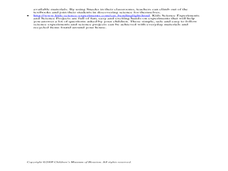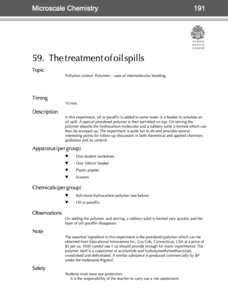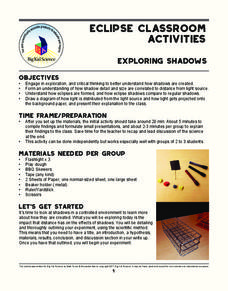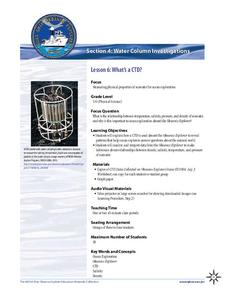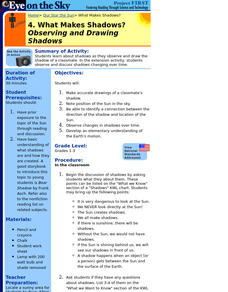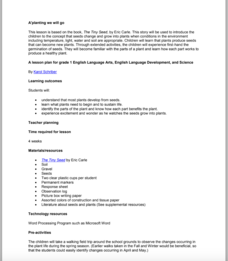Curated OER
Observing Trees
Students create a timeline of a tree in a given time span. In this life cycle lesson, students observe one particular tree at the beginning of the year, and continue their observations for several weeks to create a timeline of the...
US Department of Homeland Security
Psychological First Aide (PFA) for Students and Teachers
Listen, protect, connect! Using the resource, teachers learn how psychological first aid helps scholars adjust after a crisis or school emergency. They discover how to observe changes in pupils' school performance, listen and offer...
Curated OER
Riding on a Pendulum
A comprehensive resource gets fourth grade physical scientists making observations about the period of a pendulum and then applying knowledge to a playground swing. Through seven different stations, they will record observations and...
Curated OER
States Of Matter
Delv into the states of Matter. Students engage in the scientific inquiry process to uncover the exciting world of Matter. They watch a series of videos, and conduct experiments in order to collect and analyze data on the various state...
Virginia Department of Education
Three Types of Rocks
Rock out with the second installment of a five-part series on earth materials and processes. Your budding geologists make observations of given rock samples and posit classification systems for rocks. They then learn about the...
Curated OER
Light Travels Through Objects
Students experiment with materials that allow light to pass through. In this physical science lesson, students investigate the way light is absorbed by many different glass objects and household items. Students write their...
Royal Society of Chemistry
Lead Compounds: Precipitation Reactions and Pigments—Microscale Chemistry
Colorful lead compounds never fail to impress! Solubility scholars examine a series of double replacement reactions involving lead nitrate and record their observations. The second part of the experiment illustrates the differences...
Royal Society of Chemistry
The Treatment of Oil Spills—Microscale Chemistry
When oil spills happen, how is the oil cleaned up? Pupils of polymer science discover an amazing substance that turns oil into a solid during a microscale experiment. Individuals observe oil or paraffin before and after addition of the...
Big Kid Science
Exploring Shadows
What's that lurking in the shadows? An activity that demonstrates how eclipses happen. Science scholars investigate how light and distance interact to form shadows. The experiment uses simple materials to generate data and observations...
University of Waikato
Observing Water's Thin 'Skin'
Keep the tension up in the classroom. The class first observes as the teacher creates a dome of water above a glass by adding paperclips into an already full glass. Classmates then work in pairs to see how many drops of water can fit...
NOAA
What's a CTD?
Why are the properties of the water important when exploring the ocean? Young scientists discover the tools and technology used in deep sea exploration in the fourth installment in a five-part series. Groups work together to...
Smithsonian Institution
Science Starts With a Question: Energy - Teacher Guide
Get an up-close look at energy transfer. Using a three-part activity, investigators first observe a teacher-led demonstration before building a model marble track to convert potential energy to kinetic energy. Scientists explore six...
Princeton University
A Teacher's Guide to the Universe
Astronomers only observe four percent of the universe as the rest hides in darkness. The size, shape, and movement of the universe are the focus for an long-term high school unit. Its 43 lessons include hands-on experiments, direct...
Curated OER
What Makes Shadows? Observing and Drawing Shadows
Students make accurate drawings of a classmate's shadow. They note position of the sun in the sky. They identify a connection between the direction of the shadow and the location of the sun. They observe changes in shadows over time.
Curated OER
Making Observations: Candle Activity
In this making observations: candle activity worksheet, students write observations of an unlit candle, then write observations of a lit candle, then sort them as quantitative or qualitative observations.
Curated OER
Summer Activities: The Wonders of Nature!
Learners examine the world of nature. In this early childhood lesson plan, students develop observation skills as they bird-watch and make rainbows, experimentation skills as they explore seeds and carrots, prediction skills as they...
Curated OER
Yes We Can! Students with Autism & Down-Syndrome on the Drums!
To learn about various topics and improve their social skills, learners with special needs play along with music on drums and other sound objects. Teachers take digital pictures of the students participation and use them to make bulletin...
Curated OER
Observing the Pumpkin Cycle
Students observe and listen to nonfiction books about the life cycle of pumpkins. They practice early reading skills in a shared reading related to pumpkins. They observe the life cycle of a pumpkin including growth and decay.
Nuffield Foundation
Observing Water Moving Through Plants
We know plants assist in the water cycle, but how do plants get water from the ground into the air? Through a series of demonstrations or labs, scholars observe the movement of water through plants. They microscopically view the cells...
University of Texas
Observing the Moon
Why does it look like there is a man on the moon? Why does the moon look different every night? These are the focus questions of a lesson that prompts class members to observe and record the nightly changes of Earth's natural...
Curated OER
Training Students for Literature Circles
Role sheets clearly define expectations of all group members in this introduction to literature circles. By using a variety of picture books or short texts, readers can practice roles while the teacher circulates to each group observing...
University of Minnesota
Mirroring Emotions
Do you ever give your class the "teacher look"? Without saying a word, they become silent and engaged (hopefully). How do they know what you're thinking? Explore the concept of nonverbal communication and how it relates to our...
Curated OER
Growing A Coral Skeleton
Students research the growth of coral. In this coral polyps lesson, students simulate the growth of coral by using available materials to grow crystals. Students record observations in a scientific journal.
Curated OER
A'planting We will Go
Germination is an amazing process that results in amazing things. The book The Tiny Seed is the inspiration for a set of activities that will help build early literacy, observation, language, and writing skills. The class observes how...







